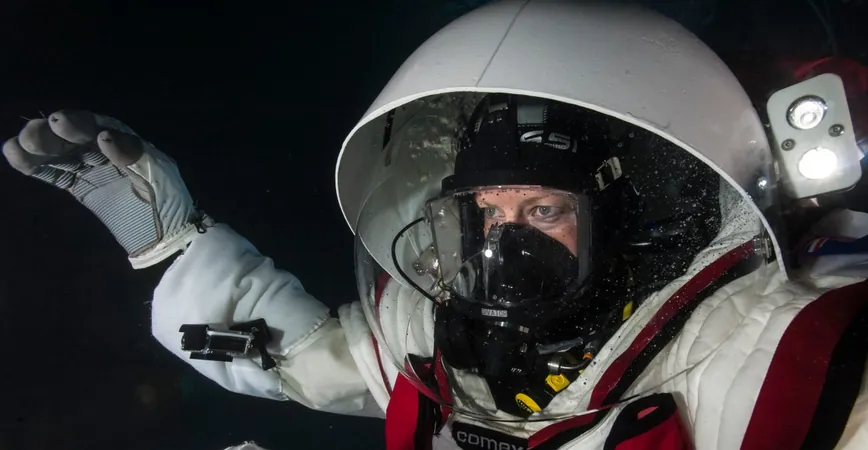
Are We Ready for Mars? The Revolutionary Role of Space Medicine
2025-09-03
Author: Wei
A Martian Dream Awaits
Imagine a future where humans thrive on Mars. But first, we must tackle an urgent problem: most people aren’t fit for safe space travel. This casts doubt on our ambitious ‘let’s colonize Mars’ plans, especially given looming global challenges like climate change.
The Harsh Reality of Becoming an Astronaut
According to Shawna Pandya, a research astronaut and director of the Space Medicine Group at the International Institute for Astronautical Sciences, the path to becoming an astronaut is littered with the dreams of those deemed medically unfit. "Once, a child diagnosed with Type 1 diabetes would hear they could be anything but an astronaut,” she recalls.
Common Medical Disqualifiers
Many conditions can disqualify you from becoming an astronaut, including: - Tobacco use - Autoimmune disorders - Sleep apnea - Asthma - Migraines
Astronauts are selected for their robust health, as the extreme conditions of microgravity can lead to serious health issues like muscle loss and osteoporosis.
The Need for Space Medicine
Haig Aintablian, director of the UCLA Space Medicine Program, likens space travel's impact on the body to that of pregnancy—it dramatically alters physiology. Barriers to travel to Mars necessitate the development of space medicine, a field still in its infancy.
Why Mars?
NASA aims to send humans to Mars as early as the 2030s, as it stands out as the closest potential home for humanity beyond Earth. Following Elon Musk’s vision for a self-sustaining Martian city by 2050, a diverse community of scientists and futurists is now deeply exploring interplanetary living.
Understanding Health Risks in Space
While we know some effects of living on the International Space Station, Martian conditions pose unique unknowns. The well-known twin study by NASA, examining the health of Scott and Mark Kelly, revealed significant physiological changes experienced by Scott during his year in orbit, indicating potential long-term health risks.
Space Tourism—An Unexpected Experiment
The rise of space tourism offers new opportunities to study diverse medical conditions in low gravity. However, brief excursions cannot simulate the arduous journey and environmental challenges of traveling to Mars.
The Medical Challenges Ahead
A Mars mission involves numerous risks: toxic dust, reduced gravity, and radiation exposure. Astronauts will have to manage medical emergencies without immediate access to Earth-based support, highlighting the critical need for advanced space medicine.
Investing in Space Medicine
In response to these challenges, space medicine programs are emerging, including plans for space nursing and paramedic training at UCLA and new European efforts. Innovations in telemedicine and AI are also paving the way for better healthcare management in space.
Bridging Earthly Issues and Space Medicine
Investing in space medicine could yield benefits back on Earth, improving healthcare technologies such as remote monitoring tools and treatments for chronic conditions. Research in space could also lead to breakthroughs in areas like muscular dystrophy and cancer.
Looking Forward
As we stand on the brink of a space-faring future, the answers we seek about human health in extreme environments are only beginning to unfold. With more investments in space medicine, the sky may no longer be the limit for human potential.
Conclusion: A New Frontier
While the journey to Mars poses significant challenges, advancements in space medicine hold the key to a sustainable human presence beyond our planet. As we continue to explore, our discoveries could revolutionize both space travel and healthcare on Earth.



 Brasil (PT)
Brasil (PT)
 Canada (EN)
Canada (EN)
 Chile (ES)
Chile (ES)
 Česko (CS)
Česko (CS)
 대한민국 (KO)
대한민국 (KO)
 España (ES)
España (ES)
 France (FR)
France (FR)
 Hong Kong (EN)
Hong Kong (EN)
 Italia (IT)
Italia (IT)
 日本 (JA)
日本 (JA)
 Magyarország (HU)
Magyarország (HU)
 Norge (NO)
Norge (NO)
 Polska (PL)
Polska (PL)
 Schweiz (DE)
Schweiz (DE)
 Singapore (EN)
Singapore (EN)
 Sverige (SV)
Sverige (SV)
 Suomi (FI)
Suomi (FI)
 Türkiye (TR)
Türkiye (TR)
 الإمارات العربية المتحدة (AR)
الإمارات العربية المتحدة (AR)